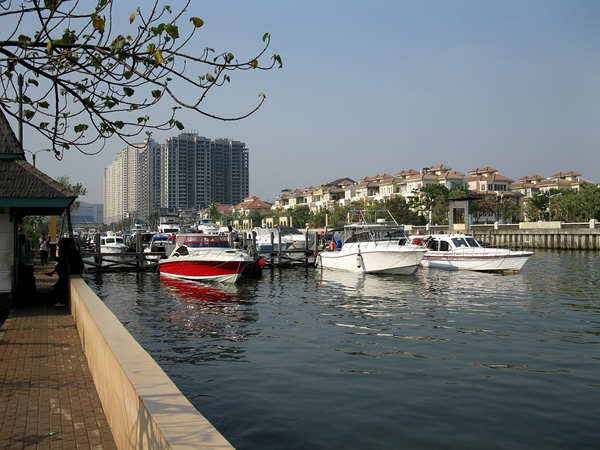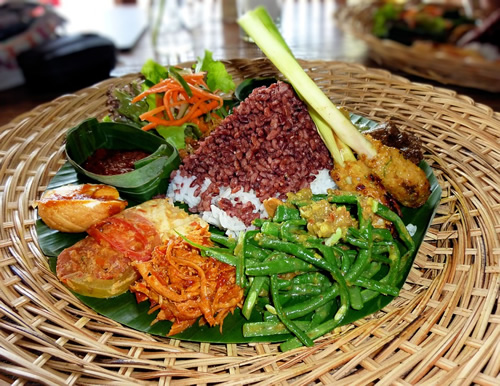Living in Indonesia: Expat Life as a Teacher in Jakarta
By Geoff Andrews

|
|
One view of Jakarta.
|
Indonesia, a country of around 250 million people in South East Asia, is abundant in natural beauty; soaring volcanoes, spectacular rice terraces, and some of the best diving in the world. Aside from the odd location in Bali and Java, the cities are of little interest for the passing tourist. For longer stays, being in a larger city with Western amenities makes some of these seemingly characterless cities a lot more attractive—especially when you develop a network of like-minded friends and have the ability to travel to some spectacular locations such as Mount Bromo.
Indonesians are naturally curious about foreigners and will pay you a lot of attention—whether you are walking down the street or sipping a quiet beer in a bar. Most of the attention involves basic questions: “Where are you from?” “What do you think of Indonesia?” If you speak a smattering of Indonesian then you will be granted a certain degree of respect; you have made the effort and Indonesians will make the effort to understand even the most pigeon form of Indonesian.
If you are used to paying your own way then you may be a bit thrown off by the prestige granted to people who pay the bill. I have had many an “argument” about who is to pay the bill when dining socially with Indonesians. I have even had people sneak off and pay behind my back despite insisting that it was my turn to pay. I really do not understand the thinking behind this custom; I can understand it in a business situation, but socially? I still cannot come to terms with the fact that even on my birthday I am expected to foot the entire bill.
Initial Impressions
The first thing that hits you in Indonesia are the smells—clove cigarettes, burning banana leaves (which have a distinctive odor), and the aroma of numerous street vendors cooking excellent dishes such as Nasi Bebek (Fried Duck and Rice—one of my favorite Indonesian dishes). Strangely enough, the open drainage channels did not smell nearly as much as they appeared they might.
The sounds coming from the mosques and the call to prayers are a soothing influence at the beginning and end of the day, and are a precursor to a hive of activity. Many Javanese still believe that you need to shower before the last prayer of the day or the devil will take control of you. Most Indonesians suspect most foreigners take less than the standard two to three showers a day and will unashamedly ask if you have had a shower as the evening prayer call comes round. Aside from this somewhat fanatic washing ritual, people tend to go about watering their plants and completing their many chores since it is simply too hot to do them in the heat of the day.
Indonesian Food
Unless you are in Jakarta or Bali (or extremely adventurous), I would recommend learning the basic food groups quickly. Everything Westerners put into sausages is served in its original form in Indonesia. To be honest, I developed a liking for thinly sliced beef tongue and deep fried chicken intestines, but I’d advise learning the words sapi (beef/cow), ayam (chicken) and ikan (fish) right off the bat. If you are vegetarian—tanpa daging means no meat—you will find quite a few dishes to meet your needs. Tanpa jeroan, meaning no innards/offal, can be a useful phrase for meat eaters.
The seafood in Indonesia is amazing and my personal favorite has to be Gurami—killed fresh and deep-fried so the bones are so crispy you can eat them. It is often served with sliced unripe mango, shallots, and chilies—pedas means spicy so sedikit pedas (a little spicy) can also be a useful phrase as Indonesian condiments can be especially hot.

|
|
A dinner in Indonesia.
|
Accommodations in Jakarta
Several employers will provide accommodation—especially if you are teaching English—or will put you up in hotels/hotel apartments. If you are going it alone, a furnished two bedroom apartment in a hotel complex starts from about $1,000 a month. Apartments in Jakarta are generally a bit cheaper than other cities. Long-term, unfurnished houses are the cheapest way to go—I paid $2,000 for two years’ rent on a 5-bedroom house in Surabaya in 2001. The rent had to be paid in advance and as I had furnishing from my previous house, it was a steal.
I have been involved in recruiting English language teachers to Indonesia for almost seven years and always advise people who don’t speak Indonesian not to get their own accommodation in an Indonesian neighborhood for the following reasons:
-
With a very low property tax system, neighborhoods take it upon themselves to put in speed bumps or other community projects. Each member of the neighborhood is expected to contribute financially. At the same time, con men attempt to extract funds from the most gullible (usually targeting young maids or teenagers/young adults looking after the house). If you do not speak Indonesian, your communication with the community may be poor. Foreigners are often unable to sort authentic offers from cons and I have seen, or had to resolve, the resulting conflicts.
-
Indonesian landlords expect the tenant to look after the house. Leaking roof? Tenant fixes it. Blocked drain? Tenant fixes it. Try handling that without speaking Indonesian…
If you do choose to live in an apartment, they generally are serviced. You can save money by registering with the gym/pool/tennis club as these features are usually included in the cost of an apartment (this is especially true in Jakarta).
When renting a house in Indonesia it is worth bearing in mind that the cultural norm is to have a maid for cooking, cleaning, and washing clothes. Maids are usually from rural communities, and for many the experience of coming to the city to work can be equated to that of a “Gap Year” experience for Westerners, as it is a common practice before settling down and getting married.
Maids are also a fantastic resource for finding good quality, local produce at excellent prices. I would even say it is one of the key elements of their job. In Indonesia, the price of a commodity is determined by what the vendor can get for it. A maid has the time to shop around if she feels the price is too high and has the local knowledge to decide how much things should cost.
Geoff Andrews spent seven years as an English teacher and then as an Academic Manager in Indonesia.
|